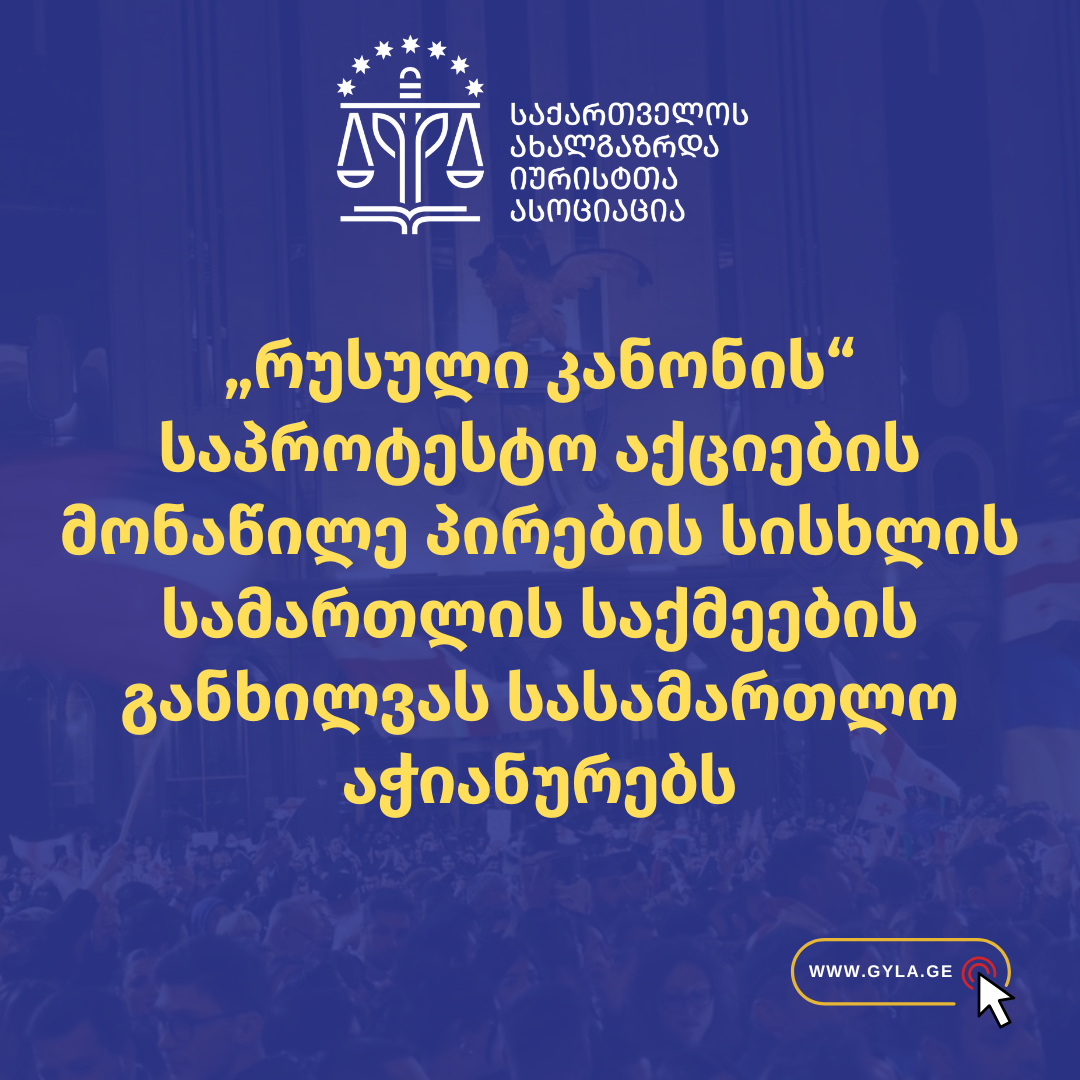NEWS

The Tbilisi City Court is currently reviewing the criminal cases of six individuals detained during the April-May protests against the "Russian Law." 1 These cases involve Saba Meparishvili, Omar Okribelashvili,2 Giorgi Okmelashvili, Davit Koldar, Giorgi Kuchuashvili, and Fridon Bubuteishvili. 7 All six remain in custody. Despite repeated appeals to review their detention, the court has upheld the application of the most severe preventive measure—imprisonment.
The hearing of the case against another activist, Giorgi Shanidze, 3 has concluded. The court found him guilty on both charges and sentenced him to four years in prison. However, a few days after the verdict, he was pardoned by the president. 4
There is a noticeable tendency for the court to schedule hearings in these cases at lengthy intervals, typically every two months, primarily due to the mandatory review of imprisonment. This practice has drawn consistent dissatisfaction from representatives of the defense.
The court is not concluding the review of these cases in a timely manner, seemingly based on the presumption that President Salome Zurabishvili cannot exercise her presidential powers to pardon activists, as she did in the case of activist Giorgi Shanidze.
In the case of Saba Meparishvili and Omar Okribelashvili, accused of collectively damaging or destroying property, 5 specifically, a 400-GEL iron protective dam—the trial initially scheduled for November 11 following the September 23 hearing was postponed due to court-related reasons. The trial was rescheduled for November 22 but, after that hearing, was again postponed for over a month, with the next trial date set for December 25.
The substantive hearing of the case of Giorgi Okmelashvili, accused of assaulting a police officer and "possession of a small amount of narcotics," 6 commenced on July 16, 2024. The last hearing in the case was held on October 3, but subsequent proceedings faced significant delays. The hearing scheduled for October 15, 2024, was postponed due to the prosecutor's failure to appear, leaving the next hearing date initially undetermined. The defense submitted multiple letters to the court, urging timely scheduling to avoid further delays. Eventually, they were informed that the next hearing was set for December 12. This prolonged process persists despite the fact that only one witness has been questioned, all other evidence is undisputed, and the case is in its final phase, with only closing arguments remaining. The defense has indicated it would require only 5–10 minutes to present its position.
The situation is similar in the cases of Giorgi Kuchuashvili and Davit Koldari, where the court hearing was postponed again on November 21, without a specific date for the hearing being set. In the case of Fridon Bubuteishvili, the hearing was postponed for more than a month after November 14 - to December 26.
All of the above is perceived as a delay in the consideration of the case and a gross violation of the defendant's right to a speedy trial and fair justice.
In addition, it is important to note that each defendant remains in custody during this period. It is unclear, especially in cases where both parties have agreed to consider the evidence beyond a doubt and no further investigation is required, why the court continues to keep individuals in custody when the threat of witness tampering has been neutralized—something the prosecution cited in almost all cases to justify detention. GYLA has previously pointed out that, in these cases, the court's use of detention was not justified by the appropriate legal standard for imposing detention. The threats were assessed in the abstract, and the goals of detention could have been achieved through other, less restrictive preventive measures.
While the state maintains an intolerant policy towards activists, punishing them as an example, there has been a lack of proper investigation into the alleged abuse of power by law enforcement officers during the "Russian Law" protests, and no efforts have been made to identify those responsible for these actions.
As is known to the public, during the protests against the "Russian law" in April-May 2024, numerous cases of ill-treatment by law enforcement officers were revealed. This ill-treatment manifested in physical and verbal retaliation against protest participants, including women, children, journalists, and opposition politicians. The law enforcement officers were particularly aggressive during arrests. Cases of ill-treatment during detention were also reported. It is worth noting that the use of force by the police was primarily retaliatory and not aimed at preventing illegal resistance or maintaining law and order. 8 The lack of an adequate response to these incidents further encourages law enforcement agencies to resort to violent tactics against activists.
GYLA continues to monitor the criminal cases of activists, including those protesting against the "Russian law", and will inform the public about the trends identified at the hearings.
1 GYLA monitors criminal cases against participants in protests against the Russian law, GYLA, 23.09.24, available at: https://gyla.ge/post/gyla-monitors-criminal-case-proceedings-against-the-demonstrators-opposing-the-russian-law#sthash.044ZzgBv.dpbs .
2 GYLA assessment on the case of Saba Mefarishvili and Omar Okribelashvili, who were arrested during the protest against the Russian law, GYLA, 25.09.2024, available at: https://gyla.ge/post/gylas-assessment-on-the-case-of-saba-mefarishvili-and-omar-okribelashvili-who-were-arrested-during-the-protest-against-the-russian-law .
3 The police arrested Giorgi Shanidze on charges of damaging a surveillance camera during a rally against the "Agents' Law" (under Article 187, Part 1 of the Criminal Code) and later accused him of cultivating cannabis (under Article 265, Part 2 of the Criminal Code).
4 President pardons Giorgi Shanidze, Radio Tavisufleba, 20.10.2024, available at: https://www.radiotavisupleba.ge/a/33128093.html.
5 The offense is provided in Article 187, Part 2, Subparagraph “c” of the Criminal Code of Georgia.
6 The Prosecutor's Office has charged Giorgi Okmelashvili with aggravated charges, Formula, 17.05.24, available at: https://formulanews.ge/News/111460.
7 The prosecution also charges him under Article 3531 of the Criminal Code of Georgia – assault on a police officer, employee of the Special Penitentiary Service, or other representative of the government or public institution – and Article 187, Part 1 – damage or destruction of property.
SHARE: